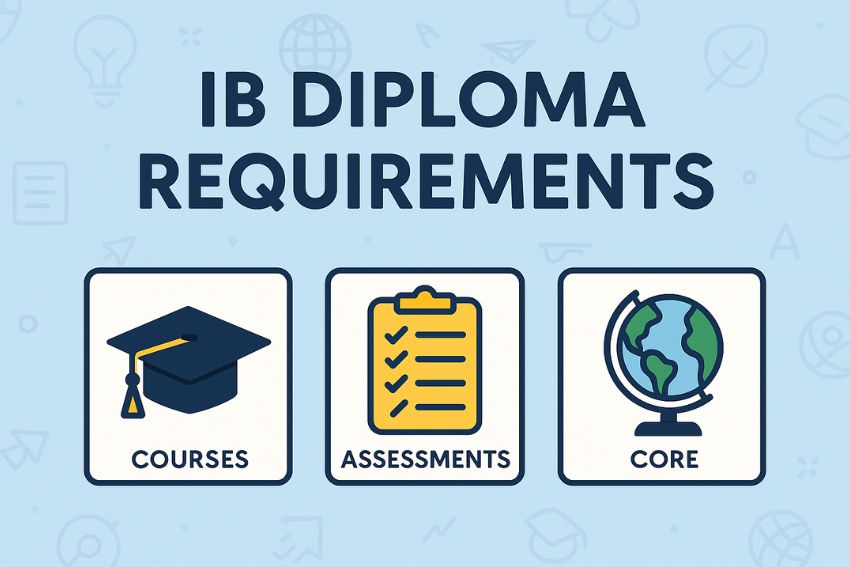IB Diploma Requirements: What You Need to Know to Pass
What Is the IB Diploma Programme?
The IB diploma requirements establish a comprehensive educational framework for students aged 16-19, balancing academic excellence with personal development. This rigorous two-year program balances depth and breadth of knowledge while fostering critical thinking and global awareness. What is an IB diploma? It’s a qualification highly respected by universities worldwide, designed to develop students intellectually, emotionally, and ethically. The programme emphasises inquiry-based learning, international-mindedness, and preparation for higher education, requiring students to study six subject groups while completing unique core components that distinguish it from other educational frameworks.
Core IB Diploma Requirements: TOK, CAS, and EE
At the heart of the IB diploma programme are three core elements that complement the academic subjects: Theory of Knowledge (TOK), Creativity, Activity, Service (CAS), and the Extended Essay (EE). TOK challenges students to question the nature of knowledge across disciplines through discussions, presentations, and a final essay. The Extended Essay requires independent research culminating in a 4,000-word paper on a topic of the student’s choice. Meanwhile, CAS develops students beyond academic pursuits, emphasising personal and interpersonal development through experiences in creativity, physical activity, and service to the community. These core components are mandatory for all diploma candidates and contribute to the holistic education approach that defines the IB philosophy.

IB Diploma Community Service (CAS) Requirements Explained
The IB diploma community service requirements form a crucial component of the CAS strand, demanding meaningful engagement with local or global communities. Students must complete a balanced program of creativity, activity, and service experiences over 18 months, with regular reflection on their learning. For the service element specifically, students need to identify authentic needs in communities and collaborate on projects that address these needs. The IB requires documentation of at least 150 hours across all CAS components, with service projects demonstrating sustained engagement rather than one-off volunteering. This focus on community service develops attributes from the IB learner profile such as caring, principled action, and reflection, preparing students to become active, compassionate global citisens.
Extended Essay – A Deep Dive into Research
The Extended Essay is a 4,000-word research paper that showcases independent academic inquiry within the IB diploma programme. Students investigate a focused research question in their chosen subject, developing university-level research skills through source evaluation, argument construction, and proper academic writing. The process includes structured reflection sessions with a supervisor and contributes up to three points toward the final diploma score when combined with Theory of Knowledge. This component develops critical thinking and analytical abilities while providing authentic preparation for undergraduate research challenges.
Theory of Knowledge – Understanding Knowledge Itself
Theory of Knowledge examines how we know what we claim to know across different disciplines within the IB diploma programme. Students explore knowledge questions by investigating ways of knowing (perception, emotion, reason, language) and areas of knowledge (sciences, arts, history, mathematics). Assessment includes an exhibition connecting real-world objects to knowledge questions and a 1,600-word essay on a prescribed title. TOK develops metacognitive awareness that enhances performance across all subjects while fostering intellectual humility and an appreciation for diverse perspectives, skills increasingly valued in higher education and professional environments.
IB Diploma Subject Groups and Scoring
The IB diploma programme requires students to select one subject from each of six subject groups: Studies in Language and Literature, Language Acquisition, Individuals and Societies, Sciences, Mathematics, and the Arts (or a second subject from groups 1-5). Students must take at least three subjects at Higher Level (HL) and the remainder at Standard Level (SL). Each subject is scored on a scale of 1-7, with a maximum of 42 points from subject assessments. Additional three points are available from combined performance in Theory of Knowledge and the Extended Essay, bringing the total possible points to 45. This balanced subject selection ensures breadth of knowledge while allowing specialisation in areas of interest or strength.

What Are the Requirements to Pass the IB Diploma?
Understanding the IB diploma requirements to pass is essential for successful completion of the program. To be awarded the diploma, candidates must achieve a minimum total of 24 points across their six subjects. However, several additional conditions apply: students must earn at least 12 points from their Higher Level subjects and at least 9 points from Standard Level subjects.
Furthermore, candidates cannot receive a grade 1 in any subject, more than two grade 2s, more than three grade 3s, or fail to complete any core requirements. The Creativity, Activity, Service component must be satisfactorily completed, and students must earn at least a D grade in both Theory of Knowledge and the Extended Essay. Meeting these minimum requirements ensures the diploma represents a meaningful educational achievement.
IB Certificate vs IB Diploma: What’s the Difference?
The distinction between IB certificate vs diploma represents different levels of engagement with the International Baccalaureate program. The full IB Diploma requires completion of all six subject groups, the three core components (TOK, CAS, EE), and meeting minimum point requirements across all assessments. In contrast, IB Certificates are awarded for individual IB courses without requiring completion of the entire program. Students taking the certificate route may focus on specific subjects of interest without fulfilling all diploma requirements. While certificates provide recognition for IB-level coursework, they don’t offer the same comprehensive qualification as the full diploma. Universities typically view the diploma more favorably, often offering advanced standing or credit, whereas certificates may be considered alongside other advanced coursework like AP classes.
Tips to Successfully Complete the IB Diploma
Successfully navigating the IB diploma programme requires strategic planning and effective time management. Start by creating a detailed schedule that allocates time for each subject, core requirements, and personal activities. For CAS, begin early and choose meaningful projects that genuinely interest you rather than accumulating hours for the sake of completion. With TOK and the Extended Essay, select topics that genuinely spark your curiosity, and establish regular check-ins with supervisors.
Maintain organised notes across all subjects, focusing on understanding concepts rather than memorisation. Form study groups to share perspectives and clarify difficult topics. Most importantly, prioritise self-care and balance, the IB is demanding, and maintaining physical and mental wellbeing is crucial for sustained performance across the two-year journey. Remember that universities value the process and skills developed during the IB as much as the final diploma score.
IB Assessment (Internal and External) – IB Grade Requirements for Passing
The IB diploma requirements to pass include a comprehensive assessment system combining internal and external evaluations. Internal assessments are initially marked by school teachers, then moderated externally, while external assessments consist primarily of final examinations. Each of the six required subjects is graded on a scale of 1-7, with a total of 42 points possible from subject grades. Up to 3 additional points can be earned from the Extended Essay and Theory of Knowledge matrix, creating a maximum possible score of 45 points. To successfully earn the IB Diploma, students must achieve a minimum of 24 points across all assessments. This criterion-referenced system evaluates students against established standards rather than ranking them against peers, ensuring consistent qualification standards worldwide.
Here are IB grades translated into UCAS points:

IB Uni Requirements – Utilising IB in a University Application
The IB diploma requirements align remarkably well with university admission standards, making it a powerful credential for higher education applications worldwide. Most prestigious institutions recognise the program’s academic rigor and holistic development approach, often offering advanced standing or course credit based on IB scores. Universities particularly value the research skills demonstrated through the Extended Essay, the critical thinking developed in Theory of Knowledge, and the personal management capabilities evidenced by the CAS component.
Compared to other secondary qualifications, the IB Diploma provides superior preparation through its emphasis on independent inquiry, analytical writing, and breadth across disciplines. This comprehensive preparation distinguishes IB graduates in competitive admissions processes, with all Russell Group universities accepting the qualification and many reportedly preferring it due to the advanced academic skills and international perspective it cultivates.
| Russell Group University | Minimum IB Grades |
|---|---|
| University of Cambridge | AAA |
| University of Oxford | AAA |
| University College London | AAA |
| Imperial College London | AAA |
| London School of Economics and Political Science | AAA |
| King’s College London | AAB |
| University of Manchester | AAA |
| University of Birmingham | AAA |
| University of Edinburgh | AAB |
| University of Bristol | AAB |
| University of Southampton | ABB |
| University of Glasgow | AAB |
| University of Sheffield | ABB |
| Newcastle University | AAB |
| University of Liverpool | ABB |
| Queen’s University Belfast | ABB |
FAQs:
What is the IB Diploma Programme?
The IB Diploma Programme is a rigorous two-year curriculum for students aged 16-19 that requires study across six subject groups plus completion of three core components: Theory of Knowledge, Extended Essay, and Creativity, Activity, Service. This internationally recognised qualification emphasises critical thinking, research skills, and global perspectives.
What are the main requirements to pass the IB Diploma?
To earn the IB diploma, students must achieve a minimum of 24 points across six subjects (scored 1-7 each), with at least 12 points from Higher Level subjects and 9 from Standard Level subjects. Students cannot receive grade 1 in any subject, more than two grade 2s, or more than three grade 3s. Additionally, all core requirements must be satisfactorily completed.
What is the community service requirement for the IB Diploma?
The IB diploma community service requirements fall under the CAS (Creativity, Activity, Service) component. Students must engage in meaningful service activities addressing authentic community needs over 18 months, document their experiences, and reflect on their learning outcomes. While no specific hour count is mandated, students must demonstrate ongoing commitment and achievement of seven learning outcomes..
What's the difference between an IB Certificate and an IB Diploma?
An IB Certificate is awarded for individual IB courses without completing the entire program, while the IB Diploma requires completion of all six subject groups plus the three core components (TOK, EE, CAS). Certificate students can take any number of IB subjects without core requirements, receiving recognition for each course completed, while Diploma students must fulfill all program elements and meet minimum point requirements.
Can you fail the IB Diploma even with good grades?
Yes, students can fail to earn the IB Diploma despite good subject grades if they: receive an E grade in Theory of Knowledge or Extended Essay, fail to complete CAS requirements, commit academic misconduct, or fail to meet specific point distribution requirements (such as minimum Higher Level points). The program requires achievement across all components, not just academic subjects.








